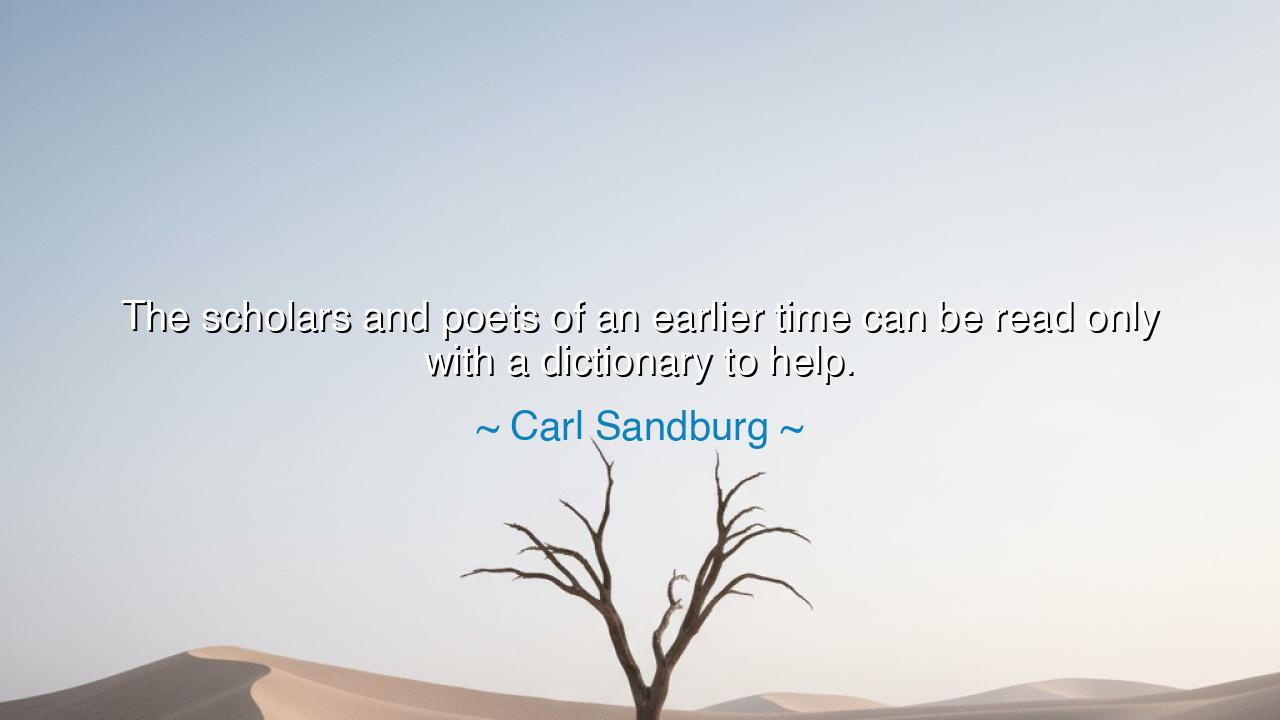
The scholars and poets of an earlier time can be read only with






Hear, O seekers of wisdom, the words of Carl Sandburg, the poet of the people, who declared: “The scholars and poets of an earlier time can be read only with a dictionary to help.” At first glance, his words seem light, even humorous—a complaint about the difficulty of old books. Yet beneath the jest lies a river of truth. The words of the ancients are heavy with meaning, built upon the stones of languages long past. They are treasure, but treasure hidden beneath the soil, requiring tools of patience and effort to uncover. The dictionary, then, becomes not merely a book of words, but a key to unlock the voices of those who came before.
The scholars and poets of ages past—Homer, Dante, Chaucer, Shakespeare, Milton—wrote in tongues that shimmer like jewels but often cut like glass. Their words, strange to the modern ear, were natural to their time, yet now they require study. Sandburg’s saying is both a lament and a reminder: to approach the wisdom of history demands work. One cannot merely glance at it and expect to understand. Just as a farmer must till the soil to harvest the crop, so too must the reader labor to comprehend the voices of the past.
Consider the story of the Rosetta Stone, buried for centuries, its inscriptions silent until scholars broke its code. Once understood, it unlocked the voices of ancient Egypt, restoring poetry, ritual, and history to the living world. Without patience, without tools, those voices would have remained forever silent. So too with Sandburg’s words: he tells us that the dictionary is our Rosetta Stone, the humble companion that allows us to converse with the dead.
Yet there is another layer. Sandburg was himself a man of plain speech, a poet who sang of workers and wanderers. He loved simplicity, the music of the common tongue. His words remind us of the gap between the lofty speech of the past and the directness of the present. To read the ancients is to climb a mountain of language, steep and jagged. But the climb itself strengthens us. The difficulty is not a barrier, but a teacher, shaping us into deeper thinkers, richer souls.
Think of Abraham Lincoln, who, with little formal schooling, taught himself by reading the King James Bible and Shakespeare. These works were not easy, filled with words that demanded thought and patience. Yet by wrestling with them, Lincoln forged his eloquence. His speeches, plain yet thunderous, carried echoes of those ancient voices. The dictionary was his ally, and through it, he bridged centuries, carrying the wisdom of the past into the heart of a nation.
The meaning, then, is twofold: first, that the wisdom of earlier poets and scholars requires effort to reach; second, that such effort is worth it. To read with a dictionary is to humble oneself, to admit ignorance, and to commit to growth. It is to say, “I do not yet understand, but I will learn.” And in that learning, one not only deciphers old words but also inherits the strength of those who wrote them.
The lesson for us is this: do not shy away from what is difficult to read, difficult to learn, or difficult to understand. Approach it with tools, with patience, with humility. If you must keep a dictionary at your side, do not be ashamed—rejoice, for you are unlocking a treasure that many will never touch. In the struggle to understand, your mind expands, and your soul grows closer to the great river of human wisdom.
So, O listeners, remember Sandburg’s wisdom: the past speaks in tongues we no longer know, but with patience, we may yet understand. Do not leave the voices of the great silent because their words are strange. Take up your tools, open the dictionary, and wrestle with them. For those who dare to seek will find, and those who labor to understand will be rewarded not only with knowledge but with kinship to all ages. In this way, the dead live again, and their wisdom flows into our present like fire passed from torch to torch.
––






AAdministratorAdministrator
Welcome, honored guests. Please leave a comment, we will respond soon